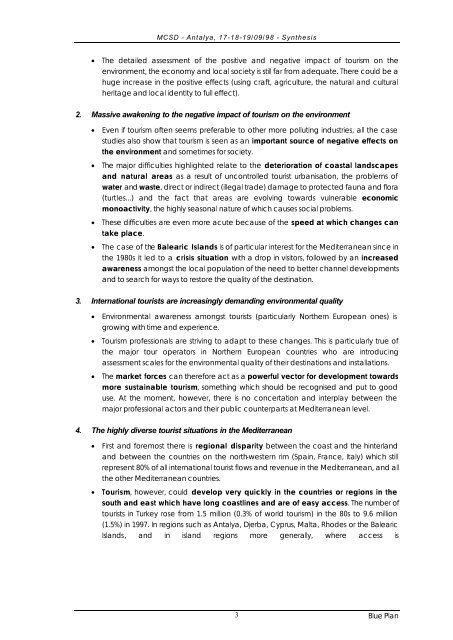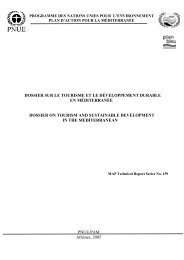- Page 1 and 2:
UNITED NATIONS ENVIRONMENT PROGRAMM
- Page 3 and 4:
Note: The designations employed and
- Page 5 and 6:
Rapport de l’Atelier sur le touri
- Page 7 and 8:
Rapport de l’Atelier sur le touri
- Page 9 and 10:
Rapport de l’Atelier sur le touri
- Page 11 and 12:
Rapport de l’Atelier sur le touri
- Page 13 and 14:
Rapport de l’Atelier sur le touri
- Page 15 and 16:
Rapport de l’Atelier sur le touri
- Page 17 and 18:
Rapport de l’Atelier sur le touri
- Page 19 and 20:
Rapport de l’Atelier sur le touri
- Page 21 and 22:
Rapport de l’Atelier sur le touri
- Page 23 and 24:
Rapport de l’Atelier sur le touri
- Page 25 and 26:
Rapport de l’Atelier sur le touri
- Page 27 and 28:
Rapport de l’Atelier sur le touri
- Page 29 and 30:
Rapport de l’Atelier sur le touri
- Page 31 and 32:
Rapport de l’Atelier sur le touri
- Page 33 and 34:
Rapport de l’Atelier sur le touri
- Page 35 and 36:
Rapport de l’Atelier sur le touri
- Page 37 and 38:
Rapport de l’Atelier sur le touri
- Page 39 and 40:
Rapport de l’Atelier sur le touri
- Page 41 and 42:
Rapport de l’Atelier sur le touri
- Page 43 and 44:
Rapport de l’Atelier sur le touri
- Page 45 and 46:
Rapport de l’Atelier sur le touri
- Page 47 and 48:
Rapport de l’Atelier sur le touri
- Page 49 and 50:
Rapport de l’Atelier sur le touri
- Page 51 and 52:
Rapport de l’Atelier sur le touri
- Page 53 and 54:
Rapport de l’Atelier sur le touri
- Page 55 and 56:
Rapport de l’Atelier sur le touri
- Page 57 and 58:
L E CONSTAT Rapport de l’Atelier
- Page 59 and 60:
Rapport de l’Atelier sur le touri
- Page 61 and 62:
Rapport de l’Atelier sur le touri
- Page 63 and 64:
Rapport de l’Atelier sur le touri
- Page 65 and 66:
Rapport de l’Atelier sur le touri
- Page 67 and 68:
Variable Rapport de l’Atelier sur
- Page 69 and 70:
Rapport de l’Atelier sur le touri
- Page 71 and 72:
Rapport de l’Atelier sur le touri
- Page 73 and 74:
Rapport de l’Atelier sur le touri
- Page 75 and 76:
Rapport de l’Atelier sur le touri
- Page 77 and 78:
Rapport de l’Atelier sur le touri
- Page 79 and 80:
Annexe 1 Résultats des questionnai
- Page 81 and 82:
Annexe 1 Résultats des questionnai
- Page 83 and 84:
Annexe 1 Résultats des questionnai
- Page 85 and 86:
Annexe 1 Résultats des questionnai
- Page 87 and 88:
Annexe 1 Résultats des questionnai
- Page 89 and 90:
Annexe 1 Résultats des questionnai
- Page 91 and 92:
Annexe 1 Résultats des questionnai
- Page 93 and 94:
Annexe 1 Résultats des questionnai
- Page 95 and 96:
Chypre Annexe 1 Résultats des ques
- Page 97 and 98:
Tunisie Annexe 1 Résultats des que
- Page 99 and 100:
Annexe 1 Résultats des questionnai
- Page 101 and 102:
Bosnie-Herz. No information Annexe
- Page 103 and 104:
Annexe 1 Résultats des questionnai
- Page 105 and 106:
France Monaco Malte Annexe 1 Résul
- Page 107 and 108:
Chypre Annexe 1 Résultats des ques
- Page 109 and 110:
Annexe 1 Résultats des questionnai
- Page 111 and 112:
Monaco Non Annexe 1 Résultats des
- Page 113 and 114:
du pays. Annexe 1 Résultats des qu
- Page 115 and 116:
Annexe 1 Résultats des questionnai
- Page 117 and 118:
Israel Annexe 1 Résultats des ques
- Page 119 and 120:
Annexe 1 Résultats des questionnai
- Page 121 and 122:
Annexe 1 Résultats des questionnai
- Page 123 and 124:
Annexe 1 Résultats des questionnai
- Page 125 and 126:
EOAEN Instruments Annexe 1 Résulta
- Page 127 and 128:
Annexe 1 Résultats des questionnai
- Page 129 and 130:
Annexe 1 Résultats des questionnai
- Page 131 and 132:
Scandinavian Leisure Group Touristi
- Page 133 and 134:
Annexe 1 Résultats des questionnai
- Page 135 and 136:
Annexe 2 Etudes de cas Case studies
- Page 137 and 138:
Annexe 2 Etudes de cas Case studies
- Page 139 and 140:
Annexe 2 Etudes de cas Case studies
- Page 141 and 142:
Annexe 2 Etudes de cas Case studies
- Page 143 and 144:
Annexe 2 Etudes de cas Case studies
- Page 145 and 146:
Annexe 2 Etudes de cas Case studies
- Page 147 and 148:
Annexe 2 Etudes de cas Case studies
- Page 149 and 150:
Annexe 2 Etudes de cas Case studies
- Page 151 and 152:
Energie Annexe 2 Etudes de cas Case
- Page 153 and 154:
Annexe 2 Etudes de cas Case studies
- Page 155 and 156:
Annexe 2 Etudes de cas Case studies
- Page 157 and 158:
Annexe 2 Etudes de cas Case studies
- Page 159 and 160:
Annexe 2 Etudes de cas Case studies
- Page 161 and 162:
Annexe 2 Etudes de cas Case studies
- Page 163 and 164:
Annexe 2 Etudes de cas Case studies
- Page 165 and 166:
Annexe 2 Etudes de cas Case studies
- Page 167 and 168:
Annexe 2 Etudes de cas Case studies
- Page 169 and 170:
Annexe 2 Etudes de cas Case studies
- Page 171 and 172:
Annexe 2 Etudes de cas Case studies
- Page 173 and 174:
Annexe 2 Etudes de cas Case studies
- Page 175 and 176:
Annexe 2 Etudes de cas Case studies
- Page 177 and 178:
Annexe 2 Etudes de cas Case studies
- Page 179 and 180:
Annexe 2 Etudes de cas Case studies
- Page 181 and 182:
Annexe 2 Etudes de cas Case studies
- Page 183 and 184:
2.9 Principauté de MONACO * Cadre
- Page 185 and 186:
Annexe 2 Etudes de cas Case studies
- Page 187 and 188:
Annexe 2 Etudes de cas Case studies
- Page 189 and 190:
Annexe 2 Etudes de cas Case studies
- Page 191 and 192:
Annexe 2 Etudes de cas Case studies
- Page 193 and 194:
Annexe 2 Etudes de cas Case studies
- Page 195 and 196:
Market structure Annexe 2 Etudes de
- Page 197 and 198:
Capital investments Annexe 2 Etudes
- Page 199 and 200:
Annexe 2 Etudes de cas Case studies
- Page 201 and 202:
Annexe 2 Etudes de cas Case studies
- Page 203 and 204:
Annexe 2 Etudes de cas Case studies
- Page 205 and 206:
Annexe 2 Etudes de cas Case studies
- Page 207 and 208:
Annexe 2 Etudes de cas Case studies
- Page 209 and 210:
Annexe 2 Etudes de cas Case studies
- Page 211 and 212:
Annexe 2 Etudes de cas Case studies
- Page 213 and 214:
Annexe 2 Etudes de cas Case studies
- Page 215 and 216:
Annexe 2 Etudes de cas Case studies
- Page 217 and 218:
Annexe 2 Etudes de cas Case studies
- Page 219 and 220:
L’organisation du marché Annexe
- Page 221 and 222:
Indicateurs Annexe 2 Etudes de cas
- Page 223 and 224:
Annexe 2 Etudes de cas Case studies
- Page 225 and 226:
Annexe 2 Etudes de cas Case studies
- Page 227 and 228:
Annexe 2 Etudes de cas Case studies
- Page 229 and 230:
Annexe 2 Etudes de cas Case studies
- Page 231 and 232:
Annexe 2 Etudes de cas Case studies
- Page 233 and 234:
Annexe 2 Etudes de cas Case studies
- Page 235 and 236:
Annexe 2 Etudes de cas Case studies
- Page 237 and 238:
Annexe 2 Etudes de cas Case studies
- Page 239 and 240: Annexe 2 Etudes de cas Case studies
- Page 241 and 242: Annexe 2 Etudes de cas Case studies
- Page 243 and 244: Annexe 2 Etudes de cas Case studies
- Page 245 and 246: Annexe 2 Etudes de cas Case studies
- Page 247 and 248: Annexe 2 Etudes de cas Case studies
- Page 249 and 250: Annexe 2 Etudes de cas Case studies
- Page 251 and 252: Annexe 3 Liste des participants Lis
- Page 253 and 254: Annexe 3 Liste des participants Lis
- Page 255 and 256: Annexe 3 Liste des participants Lis
- Page 257 and 258: Annexe 3 Liste des participants Lis
- Page 259 and 260: Annexe 3 Liste des participants Lis
- Page 261 and 262: 09h00 à 10h00 10h00 à 10h30 Pause
- Page 263 and 264: 9h00 à 10h30 10h30 - 11h00 Pause c
- Page 265 and 266: 9:00 to 10:30 Annexe 4 Programme de
- Page 267 and 268: Annexe 5 Rapport de Synthèse Synth
- Page 269 and 270: CMDD - Antalya, 17 - 18 - 19/.09/98
- Page 271 and 272: CMDD - Antalya, 17 - 18 - 19/.09/98
- Page 273 and 274: CMDD - Antalya, 17 - 18 - 19/.09/98
- Page 275 and 276: CMDD - Antalya, 17 - 18 - 19/.09/98
- Page 277 and 278: CMDD - Antalya, 17 - 18 - 19/.09/98
- Page 279 and 280: Proposition 10 : CMDD - Antalya, 17
- Page 281 and 282: V. ANNEXES CMDD - Antalya, 17 - 18
- Page 283 and 284: CMDD - LE TOURISME DANS LE DEVELOPP
- Page 285 and 286: CMDD - Antalya, 17-18-19/09/98 - Sy
- Page 287 and 288: CMDD - Antalya, 17-18-19/09/98 - Sy
- Page 289: MCSD - Antalya, 17-18-19/09/98 - Sy
- Page 293 and 294: MCSD - Antalya, 17-18-19/09/98 - Sy
- Page 295 and 296: MCSD - Antalya, 17-18-19/09/98 - Sy
- Page 297 and 298: Proposal 12: MCSD - Antalya, 17-18-
- Page 299 and 300: MCSD - Antalya, 17-18-19/09/98 - Sy
- Page 301 and 302: MCSD - Antalya, 17-18-19/09/98 - Sy
- Page 303 and 304: MCSD - Antalya, 17-18-19/09/98 - Sy
- Page 305 and 306: MTS 8. Add. (*)UNEP: Biogeochemical
- Page 307 and 308: MTS 24. UNEP/FAO: Toxicity, persist
- Page 309 and 310: MTS 45. UNEP/IAEA: Transport of pol
- Page 311 and 312: MTS 63. PNUE/OMS: Cycles biogéochi
- Page 313 and 314: MTS 88. UNEP: Proceedings of the Se
- Page 315 and 316: MTS 109. UNEP/WHO: Survey of pollut
- Page 317: Issued and printed by: Mediterranea
















